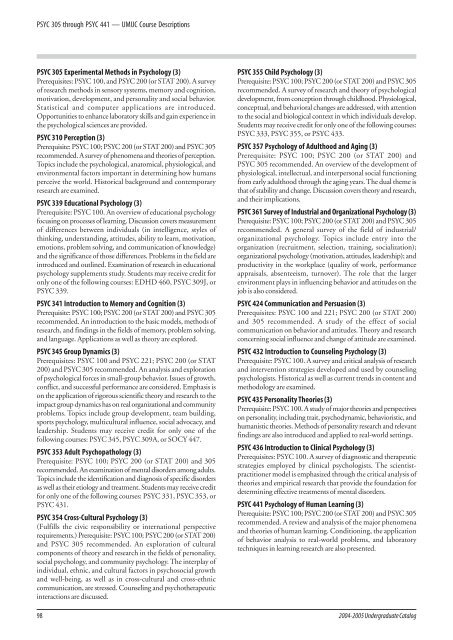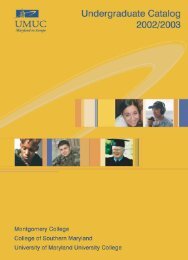Statements of Policy - UMUC Europe
Statements of Policy - UMUC Europe
Statements of Policy - UMUC Europe
You also want an ePaper? Increase the reach of your titles
YUMPU automatically turns print PDFs into web optimized ePapers that Google loves.
PSYC 305 through PSYC 441 — <strong>UMUC</strong> Course Descriptions<br />
PSYC 305 Experimental Methods in Psychology (3)<br />
Prerequisites: PSYC 100, and PSYC 200 (or STAT 200). A survey<br />
<strong>of</strong> research methods in sensory systems, memory and cognition,<br />
motivation, development, and personality and social behavior.<br />
Statistical and computer applications are introduced.<br />
Opportunities to enhance laboratory skills and gain experience in<br />
the psychological sciences are provided.<br />
PSYC 310 Perception (3)<br />
Prerequisite: PSYC 100; PSYC 200 (or STAT 200) and PSYC 305<br />
recommended. A survey <strong>of</strong> phenomena and theories <strong>of</strong> perception.<br />
Topics include the psychological, anatomical, physiological, and<br />
environmental factors important in determining how humans<br />
perceive the world. Historical background and contemporary<br />
research are examined.<br />
PSYC 339 Educational Psychology (3)<br />
Prerequisite: PSYC 100. An overview <strong>of</strong> educational psychology<br />
focusing on processes <strong>of</strong> learning. Discussion covers measurement<br />
<strong>of</strong> differences between individuals (in intelligence, styles <strong>of</strong><br />
thinking, understanding, attitudes, ability to learn, motivation,<br />
emotions, problem solving, and communication <strong>of</strong> knowledge)<br />
and the significance <strong>of</strong> those differences. Problems in the field are<br />
introduced and outlined. Examination <strong>of</strong> research in educational<br />
psychology supplements study. Students may receive credit for<br />
only one <strong>of</strong> the following courses: EDHD 460, PSYC 309J, or<br />
PSYC 339.<br />
PSYC 341 Introduction to Memory and Cognition (3)<br />
Prerequisite: PSYC 100; PSYC 200 (or STAT 200) and PSYC 305<br />
recommended. An introduction to the basic models, methods <strong>of</strong><br />
research, and findings in the fields <strong>of</strong> memory, problem solving,<br />
and language. Applications as well as theory are explored.<br />
PSYC 345 Group Dynamics (3)<br />
Prerequisites: PSYC 100 and PSYC 221; PSYC 200 (or STAT<br />
200) and PSYC 305 recommended. An analysis and exploration<br />
<strong>of</strong> psychological forces in small-group behavior. Issues <strong>of</strong> growth,<br />
conflict, and successful performance are considered. Emphasis is<br />
on the application <strong>of</strong> rigorous scientific theory and research to the<br />
impact group dynamics has on real organizational and community<br />
problems. Topics include group development, team building,<br />
sports psychology, multicultural influence, social advocacy, and<br />
leadership. Students may receive credit for only one <strong>of</strong> the<br />
following courses: PSYC 345, PSYC 309A, or SOCY 447.<br />
PSYC 353 Adult Psychopathology (3)<br />
Prerequisite: PSYC 100; PSYC 200 (or STAT 200) and 305<br />
recommended. An examination <strong>of</strong> mental disorders among adults.<br />
Topics include the identification and diagnosis <strong>of</strong> specific disorders<br />
as well as their etiology and treatment. Students may receive credit<br />
for only one <strong>of</strong> the following courses: PSYC 331, PSYC 353, or<br />
PSYC 431.<br />
PSYC 354 Cross-Cultural Psychology (3)<br />
(Fulfills the civic responsibility or international perspective<br />
requirements.) Prerequisite: PSYC 100; PSYC 200 (or STAT 200)<br />
and PSYC 305 recommended. An exploration <strong>of</strong> cultural<br />
components <strong>of</strong> theory and research in the fields <strong>of</strong> personality,<br />
social psychology, and community psychology. The interplay <strong>of</strong><br />
individual, ethnic, and cultural factors in psychosocial growth<br />
and well-being, as well as in cross-cultural and cross-ethnic<br />
communication, are stressed. Counseling and psychotherapeutic<br />
interactions are discussed.<br />
98<br />
PSYC 355 Child Psychology (3)<br />
Prerequisite: PSYC 100; PSYC 200 (or STAT 200) and PSYC 305<br />
recommended. A survey <strong>of</strong> research and theory <strong>of</strong> psychological<br />
development, from conception through childhood. Physiological,<br />
conceptual, and behavioral changes are addressed, with attention<br />
to the social and biological context in which individuals develop.<br />
Students may receive credit for only one <strong>of</strong> the following courses:<br />
PSYC 333, PSYC 355, or PSYC 433.<br />
PSYC 357 Psychology <strong>of</strong> Adulthood and Aging (3)<br />
Prerequisite: PSYC 100; PSYC 200 (or STAT 200) and<br />
PSYC 305 recommended. An overview <strong>of</strong> the development <strong>of</strong><br />
physiological, intellectual, and interpersonal social functioning<br />
from early adulthood through the aging years. The dual theme is<br />
that <strong>of</strong> stability and change. Discussion covers theory and research,<br />
and their implications.<br />
PSYC 361 Survey <strong>of</strong> Industrial and Organizational Psychology (3)<br />
Prerequisite: PSYC 100; PSYC 200 (or STAT 200) and PSYC 305<br />
recommended. A general survey <strong>of</strong> the field <strong>of</strong> industrial/<br />
organizational psychology. Topics include entry into the<br />
organization (recruitment, selection, training, socialization);<br />
organizational psychology (motivation, attitudes, leadership); and<br />
productivity in the workplace (quality <strong>of</strong> work, performance<br />
appraisals, absenteeism, turnover). The role that the larger<br />
environment plays in influencing behavior and attitudes on the<br />
job is also considered.<br />
PSYC 424 Communication and Persuasion (3)<br />
Prerequisites: PSYC 100 and 221; PSYC 200 (or STAT 200)<br />
and 305 recommended. A study <strong>of</strong> the effect <strong>of</strong> social<br />
communication on behavior and attitudes. Theory and research<br />
concerning social influence and change <strong>of</strong> attitude are examined.<br />
PSYC 432 Introduction to Counseling Psychology (3)<br />
Prerequisite: PSYC 100. A survey and critical analysis <strong>of</strong> research<br />
and intervention strategies developed and used by counseling<br />
psychologists. Historical as well as current trends in content and<br />
methodology are examined.<br />
PSYC 435 Personality Theories (3)<br />
Prerequisite: PSYC 100. A study <strong>of</strong> major theories and perspectives<br />
on personality, including trait, psychodynamic, behavioristic, and<br />
humanistic theories. Methods <strong>of</strong> personality research and relevant<br />
findings are also introduced and applied to real-world settings.<br />
PSYC 436 Introduction to Clinical Psychology (3)<br />
Prerequisites: PSYC 100. A survey <strong>of</strong> diagnostic and therapeutic<br />
strategies employed by clinical psychologists. The scientistpractitioner<br />
model is emphasized through the critical analysis <strong>of</strong><br />
theories and empirical research that provide the foundation for<br />
determining effective treatments <strong>of</strong> mental disorders.<br />
PSYC 441 Psychology <strong>of</strong> Human Learning (3)<br />
Prerequisite: PSYC 100; PSYC 200 (or STAT 200) and PSYC 305<br />
recommended. A review and analysis <strong>of</strong> the major phenomena<br />
and theories <strong>of</strong> human learning. Conditioning, the application<br />
<strong>of</strong> behavior analysis to real-world problems, and laboratory<br />
techniques in learning research are also presented.<br />
2004-2005 Undergraduate Catalog






